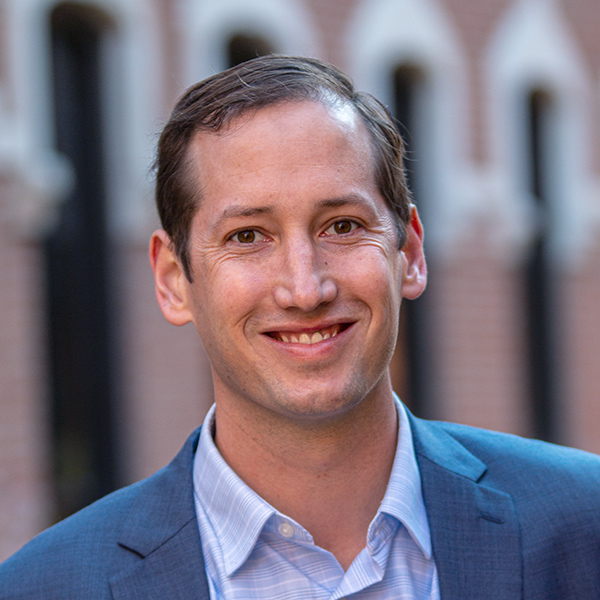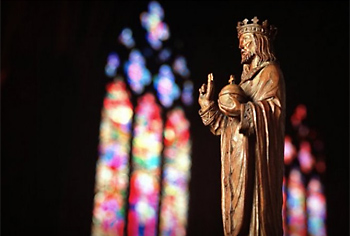However much they might aspire to positions of leadership, most young people start their careers in jobs and institutions or organizations that seem somehow “less than.”
Their responsibilities and the organizations for which they work can seem pale compared with the prestigious titles and prominent organizations that surround them.
For me and other young adults, it’s as if we walk in the shadows -- both of large and powerful institutions and of the dreams that we have to work for them someday. We look up, and we long for the moment when we will at last have our chance to serve on a larger stage.
Maybe that’s not the way it is for you. But it is for me.
I’m an M.Div. student at Duke Divinity School who also works part time for the school’s Center for Reconciliation. Though the center does extraordinary work, it is a very small part of a very large and prestigious university, an institutional microorganism situated somewhere within a behemoth.
I’m reminded of this regularly as I walk past Duke’s soaring gothic chapel -- the very symbol of the university -- on my way to our small office, tucked into the basement of the nearby divinity school. From our window, if I contort myself just right, I can peek out and up and see the chapel spire stretching to the sky, telling the world that it is there.
Meanwhile, down in the basement, I wonder: Does anybody know I am here?
I appreciate both Duke and the Center for Reconciliation, but I have to admit, my hopes and dreams to work someday for a major institution, whether a church, a university or a nonprofit, often distract me from the work that is before me now. Though I work hard, I do so with a divided mind, one eye on my current work and the other looking for the next opportunity.
From talking to other young adults, I gather that I’m not alone. We start at the bottom and have to “serve our time.” We have to “pay our dues.” But we do so with the hope of greater opportunity, responsibility and -- if we are honest -- prestige to come in the future.
As I attempt to walk the fine line between ambition and faithfulness, I’ve recently found encouragement in, of all places, Revelation and its characterization of the new Jerusalem: “I saw no temple in the city, for its temple is the Lord God the Almighty and the Lamb” (Revelation 21:22 NRSV).
Whether you’re a recent college graduate, filing and making copies for the boss, or a university president, a newly ordained pastor or a bishop, that text from Revelation holds a powerful lesson. Christian leaders understand cities, but the city that Revelation describes is a city without its central institution. It is a city without a temple.
Revelation’s peculiar city is a reminder that all human institutions and organizations will one day pass away. Even as the church and other institutions pursue their work, exercising their formative role and divine mandate, this text tells us that they are fading.
Every institution’s mission, endowment, legacy, board, partners, members, programs, alumni and accomplishments will end. Though institutions can and do play a formative role now, in this time and moment, that role is always of secondary importance.
It is not the institutions in which we serve that offer the hope of reconciliation but the God who sustains them. Ironically, our great affection for the institutions in which we serve or hope to serve can blind us to both their temporal nature and the God who sustains them.
As we gaze up at the grandeur of a university chapel, it is easy to forget the God for whom it is built and who daily sustains it.
Yet Revelation also reminds us that however fleeting institutions might be, they are still important -- though not always in the ways that we think they are. The writer of Revelation did not see a temple. For, as he quickly added, “its temple is the Lord God the Almighty and the Lamb.”
That is, the vision is not a city without a temple but a new city with a new temple. It’s not that institutions are unimportant, the writer of Revelation seems to say. It’s that they are only of secondary importance, in relation to the kingdom of God.
As scholar Jeff Vogelgesang has noted in his study on the interpretation of Ezekiel in Revelation, the writer of Revelation was perhaps looking to the Old Testament prophet for his model of a temple. In Ezekiel 40-48, seven of the nine chapters are devoted to describing the temple, its practices and rituals.
By comparison, Revelation devotes only one sentence in chapter 21 to the same topic. In the new Jerusalem, the importance of institutions and organizations will be transformed.
Whenever I talk with other young adults about my interest in institutions, they usually look at me curiously. They are, at best, only slightly interested. At worst, they are skeptical about or even hostile to institutions.
Maybe they’ve experienced an institution having become, as Wendell Berry laments, “a world unto itself,” and as a result distrust institutions and question their importance. Passages such as Revelation 21, however, clearly indicate the importance of institutions in God’s cosmic vision for reconciliation.
Berry and many of my peers are right to push back at institutions’ tendency to become isolated and self-sufficient. Institutions were never intended to be an end in themselves.
But institutions can and do serve God’s cosmic vision for reconciliation. In Revelation, God does not do away with the temple but overaccepts it by becoming the new temple for the people of God.
Ultimately, Revelation’s description of a city without a temple affirms both the role of institutions in preparing for the kingdom of God and their fundamental temporality.
For me, the text is clear. Both this great university and the small center in which I work do matter, though not necessarily in the way that I sometimes think they do. Revelation also reminds us that, grand or unnoticed, all institutions and organizations pass away.
Ever since arriving at Duke, I’ve enjoyed listening to the Duke carillon, which rings out from the chapel every weekday at 5 p.m.
Down in the basement, as I hear the bells ringing, I think about the role of this university and of our small center and the work that I contribute to it, preparing proposals and spreadsheets, supporting student programs and conferences and curriculum development.
They are not really all that different, the university and our center. They are united by God’s vision for institutions and the people within them. And as I serve today, I strive to serve with an undivided consciousness and full commitment to this place and time.















